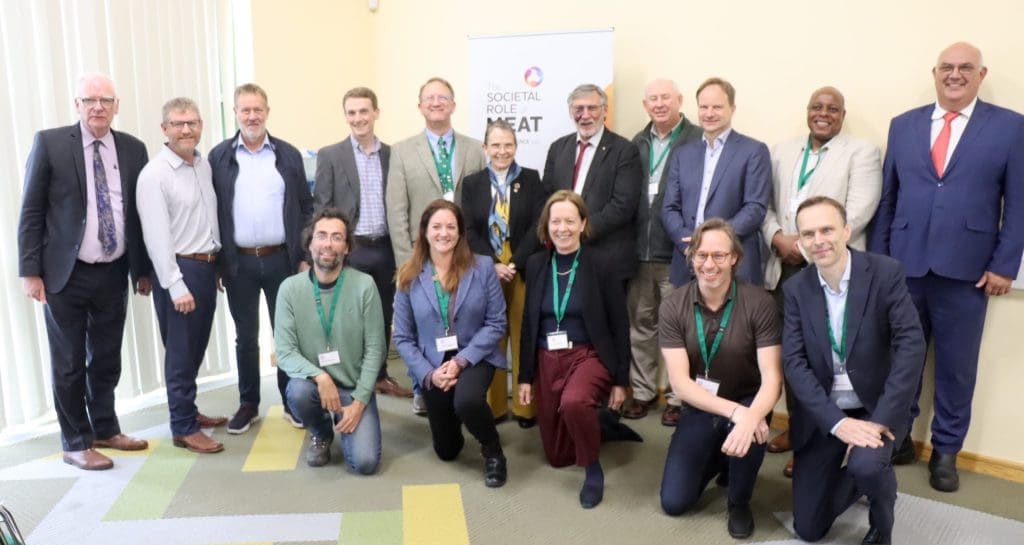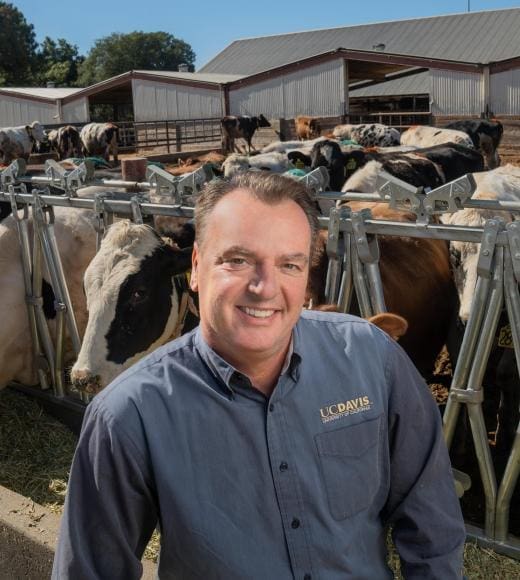
Presenters at the two-day summit on the societal role of meat in Dublin last year included Declan Troy, Jason Rowntree, Willhelm Windisch, Nick Smith, Peter Ballerstedt, Shirley Tarawali, Paul Wood, Neil Mann, Peer Ederer, Max Makuvise, Theo de Jager, Pablo Manzano, Diana Rodgers, Alice Stanton, Bradley Johnson and Frederic Leroy.
This opinion piece was put together by the authors of the Dublin Declaration, a document signed by more than 1000 scientists recognising the essential role of meat, in response to a series of campaigns aiming to discredit their cause. The article is shortened from the full version, which can be found here. All authors’ names can be found at the bottom.
As either initiators or signatories of the Dublin Declaration, we first wish to clearly lay-out our positions as scientists in the contentious research field of livestock systems and animal source foods.
With the Declaration, we are making the point that animal agriculture needs to be safeguarded from baseless and exaggerated accusations. What we are not advocating for is the preservation of the status quo. In the past we have consistently underscored the imperative need for substantial reforms within the food system.
Our perspective centres on embracing more eco-friendly production systems while shifting from a diet dominated by ultra-processed convenience foods to more wholesome dietary patterns with rich diversity.
It is crucial, however, to recognise that the distinction between animals and plants creates a false dichotomy, as if there was a trade-off between the one and the other.
Every diet as well as every agricultural production system depends critically on the integration of both. However, for various reasons of either commercial or ideological profit, coordinated campaigns are disproportionately placing blame on animal agriculture for many of the ills of the global food system. Opposing this imbalance in the conversation typically leads to fervent resistance from a vocal minority. Often, this also comes with aggressive accusations of industry bias and corruption.
Why engage in the debate?
If we feel compelled to engage in this debate and take the risk of being exposed to hostility and intimidation, it is because of our academic and civic responsibilities to scientifically counteract ideological radicalism that could result in irreparable harm when put into action.
To be clear: the initiators of the Declaration are not benefiting financially from their efforts in any way. For the sake of transparency, an overview of potential conflicts of interest can be read here (and here for the founder of this website).
What this overview does demonstrate, however, is an active involvement with certain stakeholders in the field of animal production, which is also the case for many, if not most, scientists on the list of signatories.
For some, this may also involve declared funding of research. It is not only reasonable but also essential for academics to offer their expertise and insights to the societal actors within their area of specialisation, while also learning from them.
In this ongoing controversy, all parties involved need to engage in introspection, but the prevailing assumption that those voices condemning livestock practices are consistently well-intentioned and devoid of bias is thoroughly misguided.
Set out below are two of four examples put forward by the group. The full list of four can be accessed on Prof Frederic Leroy ‘s website, click here.
The coordinated attempt to discredit Professor Frank Mitloehner
Frank Mitloehner holds a professorship at the Department of Animal Science at the University of California, Davis, where he specialises in areas such as air quality, livestock housing, and husbandry.
He is widely recognised for his role as the director of the CLEAR Center and his influential work as a science communicator. While advocating for a shift in livestock agriculture to reduce methane emissions, he also emphasises that animal production systems can and should be part of the solution.
This perspective has not been well-received within activist circles, and the impact of Mitloehner’s work became a cause of concern to those ideologically invested in anti-livestock agendas. (See Beef Central’s previous article)
The journalistic campaign to frame Mitloehner as an industry scientist started when Sentient Media’s managing editor, Jenny Splitter, published an accusatory piece on the Undark website.
In that piece, Matthew Hayek was interviewed to support the premise that Mitloehner is biased. After having obtained documents through Freedom of Information laws, a collaboration involving Zach Boren and The New York Times was launched in 2022 to allege that the scientific activities of Mitloehner are influenced by funding from the livestock sector. Boren’s article was then used to readdress the case on Sentient Media.
Mitloehner’s response to the accusations was published soon after. His message was clear: “Animal scientists work with animal agriculture. That’s it. That’s the exposé, the conspiracy that so many activists and journalists want to share with you.”
“I am transparent about my collaboration with the livestock industry. My research lab receives grants to conduct research for the agricultural sector, as well as the public sector.
“My job as a professor and cooperative extension air quality specialist is to work with members of the industry to improve the environmental performance of the food they grow. I don’t mean that figuratively; it’s written in my job description.”
For the dispassionate observer, it is hard to see what this whole issue was about. Scientific experts in the domain of animal agriculture often work with stakeholders in farming, ranching, or the agri-food industry. When potential conflicts of interest are declared, any accusation of bias is to be seen as an attack on the scientific integrity of the researcher. The real question is: why the vitriol?
The torpedoing of the Dublin Declaration
It is precisely as a reaction to such problematic incursions into the scientific debate, that the Dublin Declaration of Scientists on the Societal Role of Livestock was established. (See Beef Central’s coverage of the Dublin Declaration here)
It was initiated by the Organising Committee for the International Summit on The Societal Role of Meat, hosted by the Irish state agency for agriculture Teagasc in 2022.
Authorship lies with the 36 scientist co-authors who contributed to the proceedings of the Summit. Signed by more than 1000 scientists who share the concern that the debate on livestock agriculture is severely unbalanced, it argues that ‘Livestock systems must progress on the basis of the highest scientific standards. They are too precious to society to become the victim of simplification, reductionism or zealotry’.
Vilification of the Declaration followed the same playbook as the other cases mentioned above, in particular the campaign against Mitloehner. Sentient Media made the first move, publishing an article with an accusatory tone and headline: ‘The Dublin Declaration is riddled with animal industry bias’. Whereas in the Mitloehner campaign a collaboration was set up with The New York Times to bring the story into mass media, this time The Guardian was involved Hayek was quoted.
Let us set the record straight, once more. Neither the Declaration nor the Dublin Summit received financial backing from the industry, nor was their content influenced. All Committee members contributed to this initiative on a purely voluntary basis, driven by their scientific concerns, and without any remuneration.
The sole financial support, a modest sum of 40,000 Euros, was provided by Teagasc to facilitate the organisation of the Summit.
 Moreover, the Committee diligently scrutinises all signatures to ensure that only scientists affiliated with universities or research-oriented institutions are included. While some of these individuals collaborate with the livestock industry in their research and received and declared funding for it (which is what their host institutions ask them to do to begin with and is common practice in most applied scientific disciplines), others do not. Yet, accusing any of the signatories of conducting biased research under industry influence is unfounded and intended to harm their reputation.
Moreover, the Committee diligently scrutinises all signatures to ensure that only scientists affiliated with universities or research-oriented institutions are included. While some of these individuals collaborate with the livestock industry in their research and received and declared funding for it (which is what their host institutions ask them to do to begin with and is common practice in most applied scientific disciplines), others do not. Yet, accusing any of the signatories of conducting biased research under industry influence is unfounded and intended to harm their reputation.
We are yet to receive a specific identification of which exact statement within the Declaration is considered erroneous, unbalanced, or indicative of industry bias.
While the reference to ‘zealotry’ has sparked some understandable controversy, the examples above illustrate that this concern is not an imaginary problem. To be fair, a group of scientists has responded to our commentary in Nature Food regarding the Declaration, and we appreciate such responses as part of the scientific process.
However, we fail to see how this response would undermine the Declaration’s overall validity. Apart from expressing certain assumptions about what animal production should look like according to the authors, and an unwarranted confidence in the potential of cellular agriculture to make up for the nutrient gaps created by a radical transition, one particular sentence in the response stands out:
“a comprehensive ethical analysis does not endorse favouring economic or socio-cultural factors over the obligation to uphold the interests of morally significant beings. To include only humans in the latter group is now widely regarded as speciesism or human chauvinism.”
Where to take it from here?
As scientists, our objective is to critically examine the most suitable forms of agriculture that would ensure a healthy and sustainable future and to what extent they can be effectively implemented or expanded.
It appears, however, that meaningful discussions are complicated by the fact that the profession of livestock agriculture, or the eating of animal source foods, is now seen as a form of ‘human chauvinism’.
By Prof Frédéric Leroy (Vrije Universiteit Brussel, Belgium), Prof Keith Belk (Colorado State University, USA), Prof Antonella Dalle Zotte (University of Padova, Italy), Prof Stefaan De Smet (Ghent University, Belgium), Prof Frank Dunshea (President of the World Association of Animal Production; University of Melbourne, Australia; University of Leeds, UK), Prof Peer Ederer (GOAL Sciences, Switzerland), Prof em Bjørg Egelandsdal (Norwegian University of Life Sciences, Norway), Prof Mario Estévez (Universidad de Extremadura, Spain), Dr Mohammed Gagaoua (INRAE, France), Dr Jean-François Hocquette (INRAE, France; French Academy of Agriculture), Prof Anders Karlsson (Swedish University of Agricultural Sciences, Sweden), Collette Kaster (American Meat Science Association, USA), Dr Mohammad Koohmaraie (IEH Laboratories and Consulting Group, USA), Prof Michael RF Lee (Harper Adams University, UK; Co-Chair UK Universities Climate Network, Net Zero Group), Prof Carol Lorenzen (Oregon State University, USA), Dr Pablo Manzano (Basque Centre for Climate Change, Spain), Prof Andrew Milkowski (University of Wisconsin, USA), Prof Frank Mitloehner (University of California, Davis, USA), Dr Fabio Montossi (Instituto Nacional de Investigación Agropecuaria, Uruguay), Prof em David Pethick (Murdoch University, Australia), Dr Rod Polkinghorne (Birkinwood, Australia), Prof Giuseppe Pulina (University of Sassari, Italy), Dr Andrea Rosati (European Federation of Animal Science), Prof Jason Rowntree (Michigan State University, USA), Prof John Scanga (Colorado State University, USA), Prof Alice Stanton (RCSI University of Medicine and Health Sciences, Ireland), Prof Robyn Warner (University of Melbourne, Australia), Prof Wilhelm Windisch (Technical University Munich, Germany)

